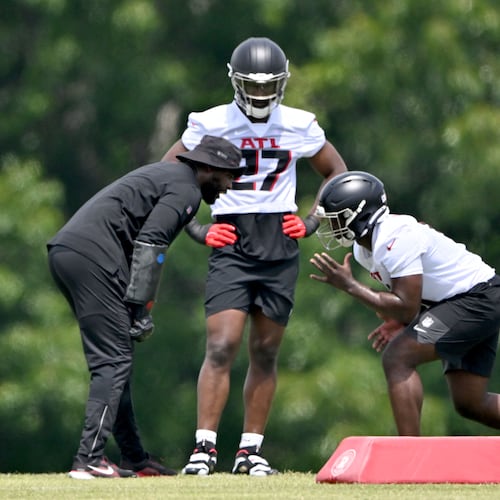It’s unclear why we’re looking to the NFL for guidance regarding domestic violence and child cruelty. Those weighty matters were besetting our troubled world long before anyone inflated a pigskin. But here we are, waiting to see what Roger Goodell does next, even as we realize that nobody in the NFL, from the commissioner on down, has the foggiest notion.
The league that seeks to control everything has stumbled over that which is uncontrollable — human behavior. Ray Rice was charged with slugging his fiancee (now his wife) in an elevator, leading Goodell to suspend him for two games. After TMZ found the video that apparently escaped the NFL’s notice, the abashed Baltimore Ravens were moved to cut Rice outright.
The video, which surfaced Sept. 7, prompted cries that Goodell resign or be fired for lenience. Four days later, an even bigger NFL name — Adrian Peterson of Minnesota — was indicted on charges of beating his 4-year-old son. The Vikings withheld Peterson from Sunday’s game but planned to let him play this weekend. Facing a public outcry that extended to the Minnesota governor’s mansion, they reversed course and placed him on the exempt list pending resolution of the case.
Later Wednesday, Carolina placed defensive end Greg Hardy, who was found guilty by a judge on two charges of domestic violence and is awaiting a jury trial, on the exempt list. Hardy played in the Panthers’ season opener but was withheld from Sunday’s game. The NFL’s code of morality changes hour by hour. (And here we note that the star of Sunday night’s game, Chicago receiver Brandon Marshall, has been accused of domestic violence.)
To say the NFL has an image problem obscures the greater truth: It has a reality problem. According to USA Today’s database, 38 NFL players have been arrested for “crimes more serious than common traffic violations” in 2014. Of those, 11 involved assault, battery, child abuse or domestic violence. (We stipulate that not all arrests lead to conviction or even trial.)
From USA Today’s data dating to 2000, Benjamin Morris of FiveThirtyEight.com determined that the arrest rate for NFL players is lower than the national average for males between the ages of 25 to 29, but that “domestic violence accounts for 48 percent of arrests for violent crimes among NFL players, compared with our estimated 21 percent nationally.”
Domestic violence cannot be condoned under any circumstances. Let’s be clear about that. Let’s also be clear about the sport we Americans love above all others: NFL players are paid to hit people; we pay to watch them do it. It would be wonderful if such aggression were confined to a playing field on given Sundays/Mondays/Thursdays, but how realistic is that?
These are, by trade, violent men. Only in the 21st century have we begun to grasp that the NFL’s brand of violence hasn’t come without human cost. Concussion research has led us to view the league in a way not conveyed via those lovingly shot Facenda-narrated NFL Films. A few of these massive men — and we stress that it’s only a few — have been arrested for violence against persons not outfitted with shoulder pads.
The NFL, which usually has a clear idea as to what to do next, is in a quandary. Does it let arrested players play and due process take its course? Does it bow to sponsorial pressure and keep such men off our TV screens until justice can be dispensed? Does it dare to look beyond the court of public opinion and address a deeper issue — namely, that playing NFL football might be harmful to the men who play it and those around them?
A week ago, Terrell Suggs — who plays for the Ravens, Rice’s former team, and who himself has faced allegations of domestic violence — took the field wearing a gladiator helmet. The image called to mind the cinematic Maximus, as played by Russell Crowe, staring at the Colosseum crowd and asking, “Are you not entertained?”
That’s the thing: We watch the NFL because we’re entertained. (Nearly 21 million viewed that Ravens game.) But more and more we’re starting to ask: Are we not also repulsed?
About the Author
Keep Reading
The Latest
Featured


